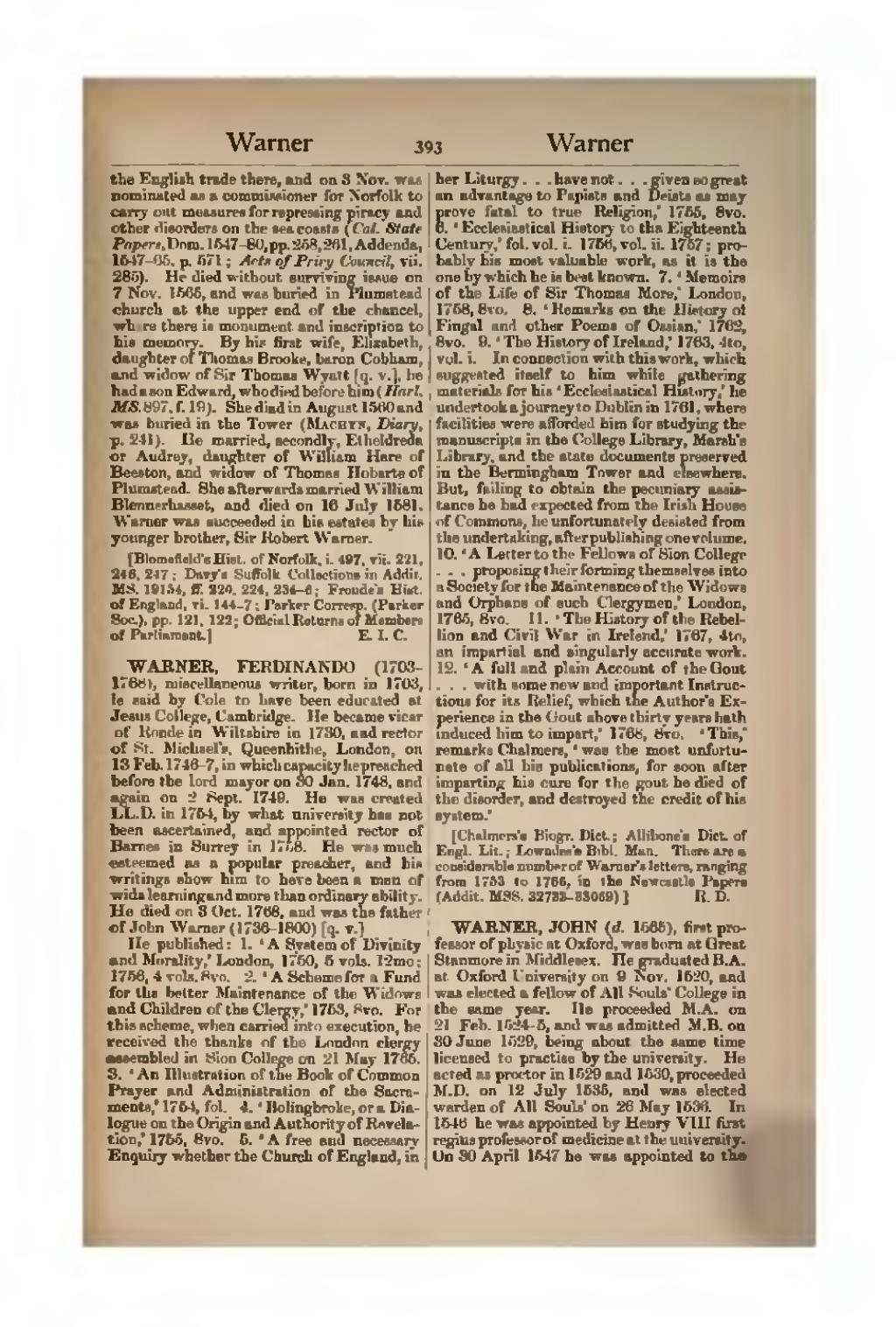the English trade there, and on 3 Nov. was nominated as a commissioner for Norfolk to carry out measures for repressing piracy and other disorders on the sea coasts (Cal. State Papers, Dom. 1547–80, pp. 258, 261, Addenda, 1547–65, p. 571; Acts of Privy Council, vii. 285). He died without surviving issue on 7 Nov. 1565, and was buried in Plumstead church at the upper end of the chancel, where there is monument and inscription to his memory. By his first wife, Elizabeth, daughter of Thomas Brooke, baron Cobham, and widow of Sir Thomas Wyatt [q. v.], he had a son Edward, who died before him (Harl. MS. 897, f. 19). She died in August 1560 and was buried in the Tower (Machyn, Diary, p. 241). He married, secondly, Etheldreda or Audrey, daughter of William Hare of Beeston, and widow of Thomas Hobarte of Plumstead. She afterwards married William Blennerhasset, and died on 16 July 1581. Warner was succeeded in his estates by his younger brother, Sir Robert Warner.
[Blomefield's Hist. of Norfolk, i. 497, vii. 221, 246, 247; Davy's Suffolk Collections in Addit. MS. 19154, ff. 220, 224, 234–6; Froude's Hist. of England, vi. 144–7; Parker Corresp. (Parker Soc.), pp. 121, 122; Official Returns of Members of Parliament.]
WARNER, FERDINANDO (1703–1768), miscellaneous writer, born in 1703, is said by Cole to have been educated at Jesus College, Cambridge. He became vicar of Ronde in Wiltshire in 1730, and rector of St. Michael's, Queenhithe, London, on 13 Feb. 1746–7, in which capacity he preached before the lord mayor on 30 Jan. 1748, and again on 2 Sept. 1749. He was created LL.D. in 1754, by what university has not been ascertained, and appointed rector of Barnes in Surrey in 1758. He was much esteemed as a popular preacher, and his writings show him to have been a man of wide learning and more than ordinary ability. He died on 3 Oct. 1768, and was the father of John Warner (1736–1800) [q. v.]
He published:
- ‘A System of Divinity and Morality,’ London, 1750, 5 vols. 12mo; 1756, 4 vols. 8vo.
- ‘A Scheme for a Fund for the better Maintenance of the Widows and Children of the Clergy,’ 1753, 8vo. For this scheme, when carried into execution, he received the thanks of the London clergy assembled in Sion College on 21 May 1765.
- ‘An Illustration of the Book of Common Prayer and Administration of the Sacraments,’ 1754, fol.
- ‘Bolingbroke, or a Dialogue on the Origin and Authority of Revelation,’ 1755, 8vo.
- ‘A free and necessary Enquiry whether the Church of England, in her Liturgy … have not … given so great an advantage to Papists and Deists as may prove fatal to true Religion,’ 1755, 8vo.
- ‘Ecclesiastical History to the Eighteenth Century,’ fol. vol. i. 1756, vol. ii. 1757; probably his most valuable work, as it is the one by which he is best known.
- ‘Memoirs of the Life of Sir Thomas More,’ London, 1758, 8vo.
- ‘Remarks on the History of Fingal and other Poems of Ossian,’ 1762, 8vo.
- ‘The History of Ireland,’ 1763, 4to, vol. i. In connection with this work, which suggested itself to him while gathering materials for his ‘Ecclesiastical History,’ he undertook a journey to Dublin in 1761, where facilities were afforded him for studying the manuscripts in the College Library, Marsh's Library, and the state documents preserved in the Birmingham Tower and elsewhere. But, failing to obtain the pecuniary assistance he had expected from the Irish House of Commons, he unfortunately desisted from the undertaking, after publishing one volume.
- ‘A Letter to the Fellows of Sion College … proposing their forming themselves into a Society for the Maintenance of the Widows and Orphans of such Clergymen,’ London, 1765, 8vo.
- ‘The History of the Rebellion and Civil War in Ireland,’ 1767, 4to, an impartial and singularly accurate work.
- ‘A full and plain Account of the Gout … with some new and important Instructions for its Relief, which the Author's Experience in the Gout above thirty years hath induced him to impart,’ 1768, 8vo. ‘This,’ remarks Chalmers, ‘was the most unfortunate of all his publications, for soon after imparting his cure for the gout he died of the disorder, and destroyed the credit of his system.’
[Chalmers's Biogr. Dict.; Allibone's Dict. of Engl. Lit.; Lowndes's Bibl. Man. There are a considerable number of Warner's letters, ranging from 1753 to 1766, in the Newcastle Papers (Addit. MSS. 32733–33069).]
WARNER, JOHN (d. 1565), first professor of physic at Oxford, was born at Great Stanmore in Middlesex. He graduated B.A. at Oxford University on 9 Nov. 1520, and was elected a fellow of All Souls' College in the same year. He proceeded M.A. on 21 Feb. 1524–5, and was admitted M.B. on 30 June 1529, being about the same time licensed to practise by the university. He acted as proctor in 1529 and 1530, proceeded M.D. on 12 July 1535, and was elected warden of All Souls' on 26 May 1536. In 1546 he was appointed by Henry VIII first regius professor of medicine at the university. On 30 April 1547 he was appointed to the
